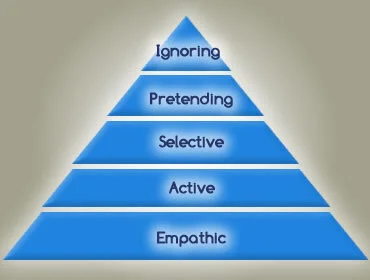7. Five levels of listening
Context: One of the key skills to deepen generative experiences is to listen, and listen deeply. This exercise increases the capacity for people to use active and empathic listening.
When to use: This exercise is used when practitioners work with men to improve communication skills and how they respond to situations.
Conducting the exercise: Draw two lines horizontally across the whiteboard. The lines are closer together on the left and further apart on the right. The lines form a funnel like appearance.
Write the word ‘Ignored’ in the far left of the two lines drawn previously. Ask the father what is it like to be ignored? What feelings are experienced?
Draw out their experience of being ignored and what it is like when they ignore their children.
Next to ‘Ignoring’, write up ‘Pretending’. Ask the man what is it like when someone they love pretends to listen to them. What is it like? What feelings are experienced? Draw out their experience and what it is like when someone pretends to listen to them. What is it like when they pretend to listen to their children? Next, write ‘Selective’ on the right side of ‘Pretending’. Repeat the above process with Selective listening.
Next is ‘Active’ listening. Many people may have never heard this term before. Explain what active listening is, using their experience in the group. Identify times when a group leader or participant has used ’active listening’ skills. What has it been like? How does it differ from the previous levels of listening? How do they think children would like to be listened to ‘actively’?
The last one is ‘Empathic’ listening. Point out the difference between empathic and active listening. Emphasis empathic listening tells you about the person and what they are experiencing than active listening.
We value empathic listening so much that many in our community pay large sums of money to see counsellors or therapists so they can be listened to in this way. What difference would it make in your relationships if you made the effort to listen empathically?
If there is sufficient time, link the five levels of listening with the anger iceberg (see next exercise).
Extension questions:
What do you experience when you use active or empathic listening skills?
What does the other person experience when you use active or empathic listening skills?
How do you use active or empathic listening skills when you feel frustrated or under a lot of pressure?

